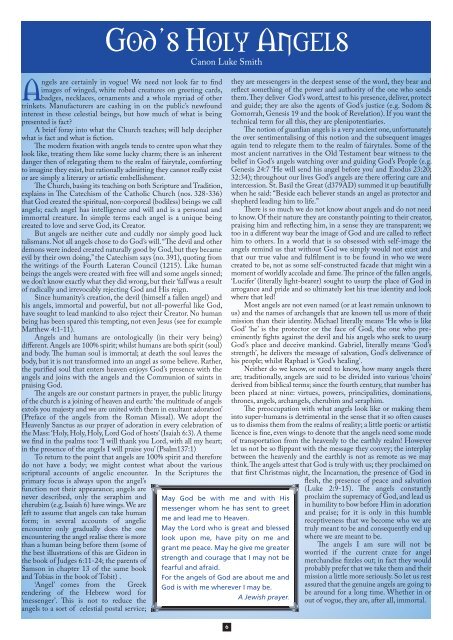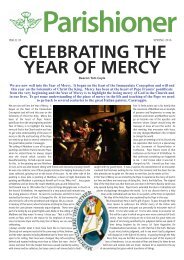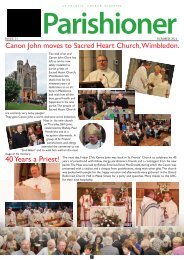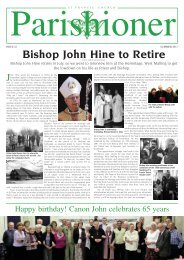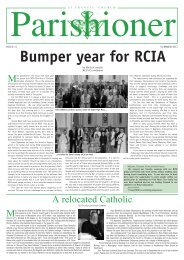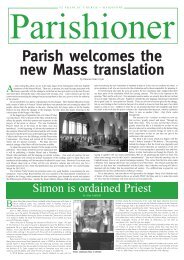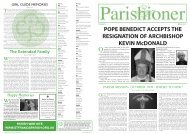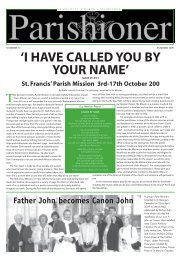The Parishioner - Edition 24
The Parishioner is the quarterly publication of St. Francis' Catholic Parish, Maidstone.
The Parishioner is the quarterly publication of St. Francis' Catholic Parish, Maidstone.
You also want an ePaper? Increase the reach of your titles
YUMPU automatically turns print PDFs into web optimized ePapers that Google loves.
God’s Holy Angels<br />
Canon Luke Smith<br />
Angels are certainly in vogue! We need not look far to find<br />
images of winged, white robed creatures on greeting cards,<br />
badges, necklaces, ornaments and a whole myriad of other<br />
trinkets. Manufacturers are cashing in on the public’s newfound<br />
interest in these celestial beings, but how much of what is being<br />
presented is fact?<br />
A brief foray into what the Church teaches; will help decipher<br />
what is fact and what is fiction.<br />
<strong>The</strong> modern fixation with angels tends to centre upon what they<br />
look like, treating them like some lucky charm; there is an inherent<br />
danger then of relegating them to the realm of fairytale, comforting<br />
to imagine they exist, but rationally admitting they cannot really exist<br />
or are simply a literary or artistic embellishment.<br />
<strong>The</strong> Church, basing its teaching on both Scripture and Tradition,<br />
explains in <strong>The</strong> Catechism of the Catholic Church (nos. 328-336)<br />
that God created the spiritual, non-corporeal (bodiless) beings we call<br />
angels; each angel has intelligence and will and is a personal and<br />
immortal creature. In simple terms each angel is a unique being<br />
created to love and serve God, its Creator.<br />
But angels are neither cute and cuddly nor simply good luck<br />
talismans. Not all angels chose to do God’s will. “<strong>The</strong> devil and other<br />
demons were indeed created naturally good by God, but they became<br />
evil by their own doing,” the Catechism says (no. 391), quoting from<br />
the writings of the Fourth Lateran Council (1215). Like human<br />
beings the angels were created with free will and some angels sinned;<br />
we don’t know exactly what they did wrong, but their ‘fall’was a result<br />
of radically and irrevocably rejecting God and His reign.<br />
Since humanity’s creation, the devil (himself a fallen angel) and<br />
his angels, immortal and powerful, but not all-powerful like God,<br />
have sought to lead mankind to also reject their Creator. No human<br />
being has been spared this tempting, not even Jesus (see for example<br />
Matthew 4:1-11).<br />
Angels and humans are ontologically (in their very being)<br />
different. Angels are 100% spirit; whilst humans are both spirit (soul)<br />
and body. <strong>The</strong> human soul is immortal; at death the soul leaves the<br />
body, but it is not transformed into an angel as some believe. Rather,<br />
the purified soul that enters heaven enjoys God’s presence with the<br />
angels and joins with the angels and the Communion of saints in<br />
praising God.<br />
<strong>The</strong> angels are our constant partners in prayer, the public liturgy<br />
of the church is a joining of heaven and earth: ‘the multitude of angels<br />
extols you majesty and we are united with them in exultant adoration’<br />
(Preface of the angels from the Roman Missal). We adopt the<br />
Heavenly Sanctus as our prayer of adoration in every celebration of<br />
the Mass: ‘Holy, Holy, Holy, Lord God of hosts’ (Isaiah 6:3). A theme<br />
we find in the psalms too: ‘I will thank you Lord, with all my heart;<br />
in the presence of the angels I will praise you’ (Psalm137:1)<br />
To return to the point that angels are 100% spirit and therefore<br />
do not have a body; we might contest what about the various<br />
scriptural accounts of angelic encounter. In the Scriptures the<br />
primary focus is always upon the angel’s<br />
function not their appearance; angels are<br />
never described, only the seraphim and<br />
cherubim (e.g. Isaiah 6) have wings. We are<br />
left to assume that angels can take human<br />
form; in several accounts of angelic<br />
encounter only gradually does the one<br />
encountering the angel realise there is more<br />
than a human being before them (some of<br />
the best illustrations of this are Gideon in<br />
the book of Judges 6:11-<strong>24</strong>; the parents of<br />
Samson in chapter 13 of the same book<br />
and Tobias in the book of Tobit) .<br />
‘Angel’ comes from the Greek<br />
rendering of the Hebrew word for<br />
‘messenger’. This is not to reduce the<br />
angels to a sort of celestial postal service;<br />
May God be with me and with His<br />
messenger whom he has sent to greet<br />
me and lead me to Heaven.<br />
May the Lord who is great and blessed<br />
look upon me, have pity on me and<br />
grant me peace. May he give me greater<br />
strength and courage that I may not be<br />
fearful and afraid.<br />
For the angels of God are about me and<br />
God is with me wherever I may be.<br />
A Jewish prayer.<br />
they are messengers in the deepest sense of the word, they bear and<br />
reflect something of the power and authority of the one who sends<br />
them. <strong>The</strong>y deliver God’s word, attest to his presence, deliver, protect<br />
and guide; they are also the agents of God’s justice (e.g. Sodom &<br />
Gomorrah, Genesis 19 and the book of Revelation). If you want the<br />
technical term for all this, they are plenipotentiaries.<br />
<strong>The</strong> notion of guardian angels is a very ancient one, unfortunately<br />
the over sentimentalising of this notion and the subsequent images<br />
again tend to relegate them to the realm of fairytales. Some of the<br />
most ancient narratives in the Old Testament bear witness to the<br />
belief in God’s angels watching over and guiding God’s People (e.g.<br />
Genesis <strong>24</strong>:7 ‘He will send his angel before you’ and Exodus 23:20;<br />
32:34); throughout our lives God’s angels are there offering care and<br />
intercession. St. Basil the Great (d379AD) summed it up beautifully<br />
when he said: “Beside each believer stands an angel as protector and<br />
shepherd leading him to life.”<br />
<strong>The</strong>re is so much we do not know about angels and do not need<br />
to know. Of their nature they are constantly pointing to their creator,<br />
praising him and reflecting him, in a sense they are transparent; we<br />
too in a different way bear the image of God and are called to reflect<br />
him to others. In a world that is so obsessed with self-image the<br />
angels remind us that without God we simply would not exist and<br />
that our true value and fulfilment is to be found in who we were<br />
created to be, not as some self-constructed facade that might win a<br />
moment of worldly accolade and fame. <strong>The</strong> prince of the fallen angels,<br />
‘Lucifer’ (literally light-bearer) sought to usurp the place of God in<br />
arrogance and pride and so ultimately lost his true identity and look<br />
where that led!<br />
Most angels are not even named (or at least remain unknown to<br />
us) and the names of archangels that are known tell us more of their<br />
mission than their identity. Michael literally means ‘He who is like<br />
God’ ‘he’ is the protector or the face of God, the one who preeminently<br />
fights against the devil and his angels who seek to usurp<br />
God’s place and deceive mankind. Gabriel, literally means ‘God’s<br />
strength’, he delivers the message of salvation, God’s deliverance of<br />
his people; whilst Raphael is ‘God’s healing’.<br />
Neither do we know, or need to know, how many angels there<br />
are; traditionally, angels are said to be divided into various ‘choirs’<br />
derived from biblical terms; since the fourth century, that number has<br />
been placed at nine: virtues, powers, principalities, dominations,<br />
thrones, angels, archangels, cherubim and seraphim.<br />
<strong>The</strong> preoccupation with what angels look like or making them<br />
into super-humans is detrimental in the sense that it so often causes<br />
us to dismiss them from the realms of reality; a little poetic or artistic<br />
licence is fine, even wings to denote that the angels need some mode<br />
of transportation from the heavenly to the earthly realm! However<br />
let us not be so flippant with the message they convey; the interplay<br />
between the heavenly and the earthly is not as remote as we may<br />
think. <strong>The</strong> angels attest that God is truly with us; they proclaimed on<br />
that first Christmas night, the Incarnation, the presence of God in<br />
flesh, the presence of peace and salvation<br />
(Luke 2:9-15). <strong>The</strong> angels constantly<br />
proclaim the supremacy of God, and lead us<br />
in humility to bow before Him in adoration<br />
and praise; for it is only in this humble<br />
receptiveness that we become who we are<br />
truly meant to be and consequently end up<br />
where we are meant to be.<br />
<strong>The</strong> angels I am sure will not be<br />
worried if the current craze for angel<br />
merchandise fizzles out; in fact they would<br />
probably prefer that we take them and their<br />
mission a little more seriously. So let us rest<br />
assured that the genuine angels are going to<br />
be around for a long time. Whether in or<br />
out of vogue, they are, after all, immortal.<br />
6


